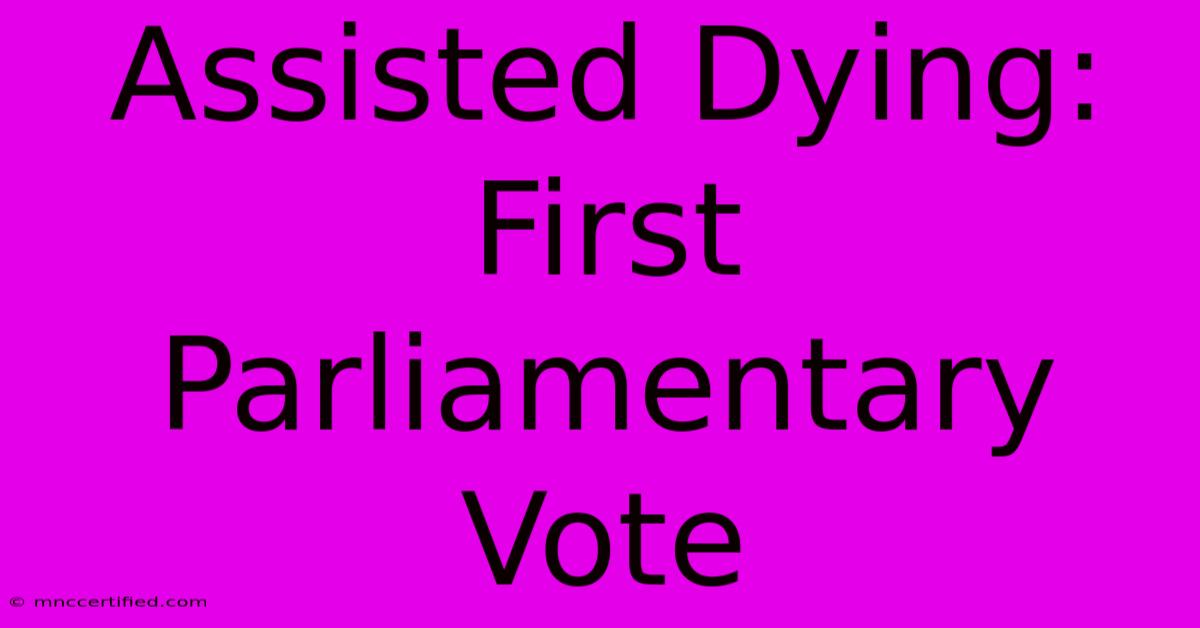Assisted Dying: First Parliamentary Vote

Table of Contents
Assisted Dying: First Parliamentary Vote – A Pivotal Moment
The UK Parliament is poised to face a momentous decision: the first ever parliamentary vote on assisted dying. This landmark event marks a significant shift in the long-standing debate surrounding end-of-life care and patient autonomy. This article will delve into the key arguments for and against assisted dying, examine the proposed legislation, and analyze the potential implications of this historic vote.
The Arguments For and Against Assisted Dying
The debate surrounding assisted dying is complex and deeply emotional, fueled by contrasting ethical, moral, and practical considerations.
Arguments in Favor:
- Patient Autonomy: Proponents argue that individuals should have the right to make choices about their own death, particularly when facing unbearable suffering from terminal illnesses. The emphasis is on self-determination and the right to a dignified exit. This is a core argument, often highlighted as a fundamental human right.
- Compassion and Relief of Suffering: Advocates highlight the immense suffering experienced by individuals with terminal illnesses, emphasizing the importance of providing compassionate end-of-life options for those experiencing intractable pain and distress. The focus here is on alleviating suffering and providing a peaceful death.
- Control and Dignity: The ability to choose the time and manner of one's death offers a sense of control and dignity in the face of a debilitating illness, potentially allowing individuals to avoid a prolonged and agonizing decline. This aspect addresses the importance of maintaining dignity at the end of life.
- Preventing prolonged suffering for families: The emotional toll on families witnessing a loved one's prolonged suffering is undeniable. Assisted dying can offer a path to reducing this burden, though this argument remains sensitive and debated.
Arguments Against:
- The Slippery Slope: Opponents express concern that legalizing assisted dying could lead to a "slippery slope," potentially resulting in the involuntary euthanasia of vulnerable individuals. This fear centers around the potential for abuse and coercion.
- The sanctity of life: Many religious and ethical perspectives emphasize the sanctity of human life, viewing assisted dying as morally wrong regardless of suffering. This viewpoint prioritizes the inherent value of life.
- Potential for errors and abuse: Concerns remain regarding the potential for misdiagnosis, coercion, and abuse within an assisted dying system. The possibility of inadvertent errors is a significant counter-argument.
- Palliative care advancements: Opponents argue that advancements in palliative care provide adequate means of managing pain and suffering, thereby reducing the need for assisted dying. The focus here is on the effectiveness of palliative care.
The Proposed Legislation: Key Features and Challenges
The specific details of the proposed legislation will be crucial in shaping the debate. Key aspects to watch for include:
- Eligibility criteria: Strict criteria are essential to prevent abuse and ensure that only those who meet specific requirements (e.g., terminal illness, unbearable suffering, capacity to make informed decisions) are eligible.
- Safeguards and oversight: Robust safeguards and independent oversight mechanisms are crucial to minimize the risks of coercion and errors. This includes meticulous documentation and independent review processes.
- Role of medical professionals: Defining the role of medical professionals in assisting with death is a delicate ethical matter.
- Public consultation and engagement: A transparent and inclusive process is essential to ensure that all perspectives are heard and considered.
The Implications of the Vote
The outcome of this vote will have profound implications for the UK healthcare system, society, and the ethical landscape surrounding end-of-life care. It will shape future discussions on patient rights, medical ethics, and the role of the state in end-of-life decisions. Regardless of the outcome, the debate is far from over, and the first vote will undoubtedly be followed by further discussion and legislative efforts.
Conclusion: A watershed moment
The first parliamentary vote on assisted dying represents a pivotal moment in the ongoing national conversation. The arguments for and against are complex and deeply felt, highlighting the sensitive nature of this issue. The debate necessitates careful consideration of ethical, legal, and practical implications, demanding a thorough and balanced approach to ensure a just and compassionate system for all. The outcome will significantly impact the future of end-of-life care in the UK.

Thank you for visiting our website wich cover about Assisted Dying: First Parliamentary Vote. We hope the information provided has been useful to you. Feel free to contact us if you have any questions or need further assistance. See you next time and dont miss to bookmark.
Featured Posts
-
Sephora Black Friday Fenty Urban Deals
Nov 30, 2024
-
Super 6 Picks Schwartzs Week 14 College Football
Nov 30, 2024
-
Black Friday 2024 35 Game Deals
Nov 30, 2024
-
Brothers Bond Whiskey Review
Nov 30, 2024
-
Tracking Best Black Friday 2024 Deals
Nov 30, 2024